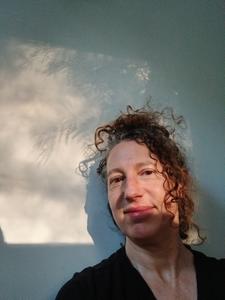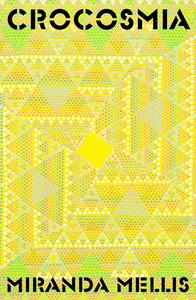 Miranda Mellis is the author of Crocosmia (Nightboat Books, August 5, 2025), a novel (or parable) of art, adventure, and radical politics, set in a world on the precipice. She has also written three novellas--The Revisionist, The Spokes, and The Quarry--and a short story collection, None of This Is Real. Her poetry and nonfiction include The Revolutionary, Demystifications, Unconsciousness Raising, and Materialisms. With Tisa Bryant and Kate Schatz, she was a founding co-editor at The Encyclopedia Project. She is a professor at Evergreen State College in Washington State.
Miranda Mellis is the author of Crocosmia (Nightboat Books, August 5, 2025), a novel (or parable) of art, adventure, and radical politics, set in a world on the precipice. She has also written three novellas--The Revisionist, The Spokes, and The Quarry--and a short story collection, None of This Is Real. Her poetry and nonfiction include The Revolutionary, Demystifications, Unconsciousness Raising, and Materialisms. With Tisa Bryant and Kate Schatz, she was a founding co-editor at The Encyclopedia Project. She is a professor at Evergreen State College in Washington State.
Handsell readers your book in 25 words or less:
Crocosmia describes a potential world on the other side of climate change and autocracy: a transformed world of ecological healing and liberation from collective suffering.
On your nightstand now:
Warlike, Howling, Pure by Areïon--it's always the time for Dionysian anti-fascism. Life-Destroying Diagrams by Eugenie Brinkema, a wildly brilliant book of film theory that limns how horror is structured. The Magic of the State by Michael Taussig, on the mystique of state power.
Favorite book when you were a child:
Jane Eyre by Charlotte Brontë. Later, reading Jean Rhys's Wide Sargasso Sea was revelatory: you mean you can talk back to the classics? Perhaps every family has someone locked up somewhere, some figure banished, hidden, elided, whose story bears reclamation. And maybe Crocosmia shares something of Jane Eyre's gothic form, its radical discontinuities and intense emotions.
Your top five authors:
I'm going to do three pairs, couples across time: Marcel Proust and Etel Adnan for poetics of memory, at opposite ends of the 20th century--they died a century apart. Henry James and Robert Glück for the finest sentences. Franz Kafka and César Aira for fiction as slapstick philosophy.
Book you've faked reading:
Hegel's The Phenomenology of Spirit. A couple of years ago I joined a study group to finally read it and only went twice. Once during Occupy I found myself in a seminar led by the poet Keston Sutherland and he recommended reading Hegel stoned. But I don't smoke weed, so what to do?
Book you're an evangelist for:
Visceral Poetics by Eleni Stecopoulos on chronic illness/chronicity, theater and poetry, and medical pluralism as a key aspect of disability justice. Her most recent book, Dreaming in the Fault Zone, explores similar terrain with an illuminating discussion of the use of divination in ancient Greek medicine.
 Book you've bought for the cover:
Book you've bought for the cover:
Touching Feeling by Eve Kosofsky Sedgwick, which contains two formative (and canonical) essays: "Pedagogy of Buddhism" and "Paranoid Reading and Reparative Reading."
Book you hid from your parents:
I never had to hide books. My family's idea of fun is everyone sitting around reading together. The delightfully raunchy comix we grew up with were strewn around by the adults.
Book that changed your life:
The Dispossessed: An Ambiguous Utopia by Ursula K. Le Guin. The Ethics of Ambiguity by Simone de Beauvoir was also a game changer for me and right now, for the first time, I am noticing that both books have "ambiguity" in their title! The Dispossessed depicts a utopia that is realistic: life will still suck when we are finally free of classism, domination, and exploitation, but much less so, and for more worthy reasons. Anarres is free of capitalism, but is ecologically difficult to survive on, as Earth increasingly is, due to climate change.
Favorite line from a book:
It's between Simone Weil: "Contradiction is the criterion of the real" from Gravity and Grace, and Hélène Cixous: "I write by the other light" from "Writing Blind: Conversation with the Donkey," where Cixous writes on having severe myopia which becomes both a method and a metaphor for visionary writing, resonating with the ancient mythopoetic of the blind seer. She describes sight as limiting--"Solar daylight blinds me to the visionary day"--and myopia as capacitating: "Even with my eyes wide open at noon I am able to not see." Édouard Glissant also undoes conflations of light with knowledge. Decoloniality is a "right to opacity." He writes, in Sun of Consciousness, of a diffractive, holographic awareness, of coming to "know one's projection in another light, the shadow of what one will be."
Five books you'll never part with:
It's so hard to narrow down, but if I constellate them it's easier, so I'm going over five again! Shōbōgenzō by Dōgen Zenji, The Imperative by Alphonso Lingis, Caliban and the Witch by Silvia Federici, Don't Let Me Be Lonely by Claudia Rankine, The Problem with Work by Kathi Weeks, and The Psychoanalytic Mystic by Michael Eigen. Lingis and Rankine show the inseparability of politics and form, aesthetics and ethics, offering language equal to experience. Eigen and Dōgen help us deal with having a mind, a psyche. Weeks and Federici teach what has happened to the worker and the witch across the world for the past 500 years.
And of course, I'll never part with my mother's faded, stained copy of Lenin's The State and Revolution. Her annotations are in pink sharpie!
Book you most want to read again for the first time:
Jakob von Gunten by Robert Walser, whom I read thanks to Lisa Robertson who told me that my first book, The Revisionist, reminded her of Walser, whom I had never heard of. Come to think of it, The Baudelaire Fractal, Robertson's wonderful "poet's novel" evokes something of Walser's antic performativity. The main protagonist in The Baudelaire Fractal, Hazel, "assumes" Baudelaire's corpus becomes, in a magical way (reading does this), its author.
On utopias and dystopias:
Going back to The Dispossessed and adding Octavia Butler's Parable of the Sower; Doris Lessing's Canopus in Argos series;and Kim Stanley Robinson's The Ministry for the Future, all of these may be read doubly as works of art and forms of guidance, sources of moral vision. Taking seriously the ways in which representation participates in shaping reality, would it be helpful politically (to put it modestly, as art has its limitations) if there were as many, or more, utopias on offer (however ambiguous and ambivalent) as there are dystopias?

